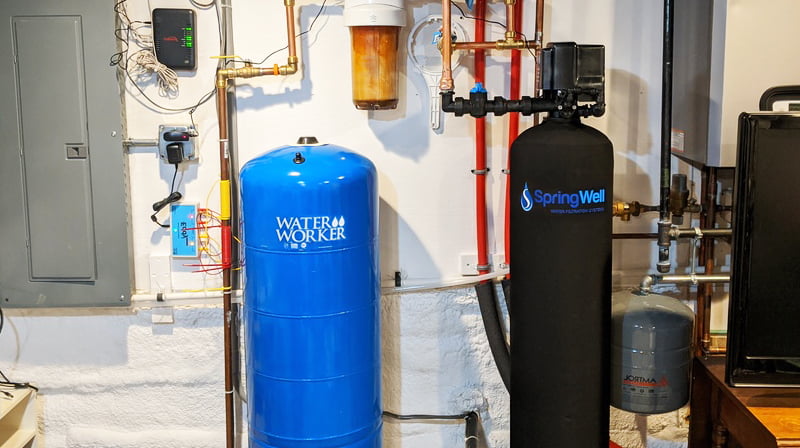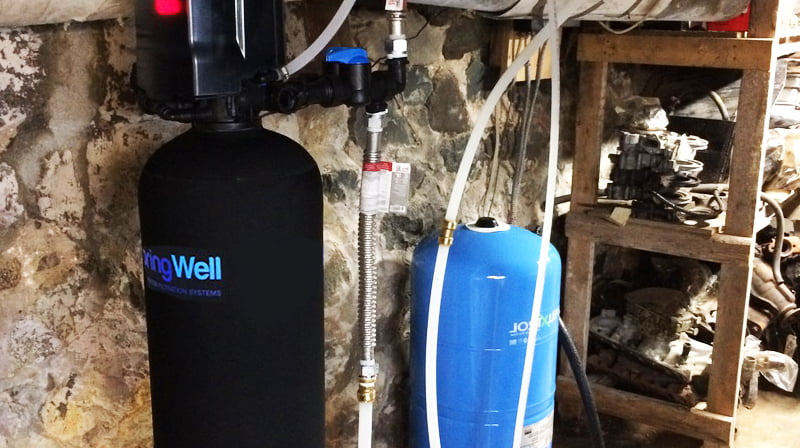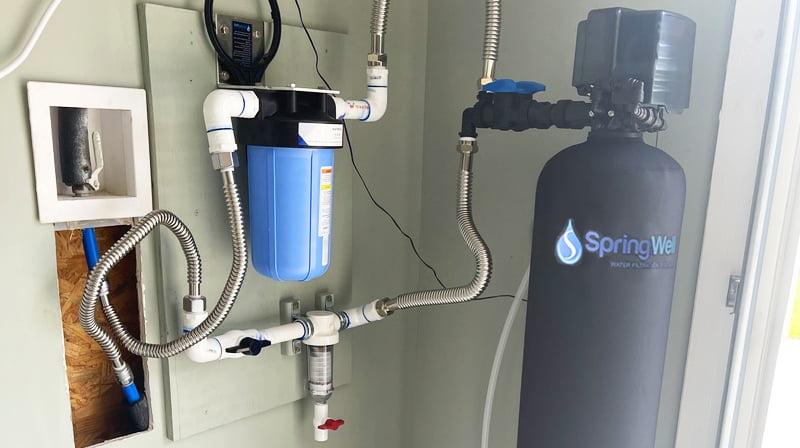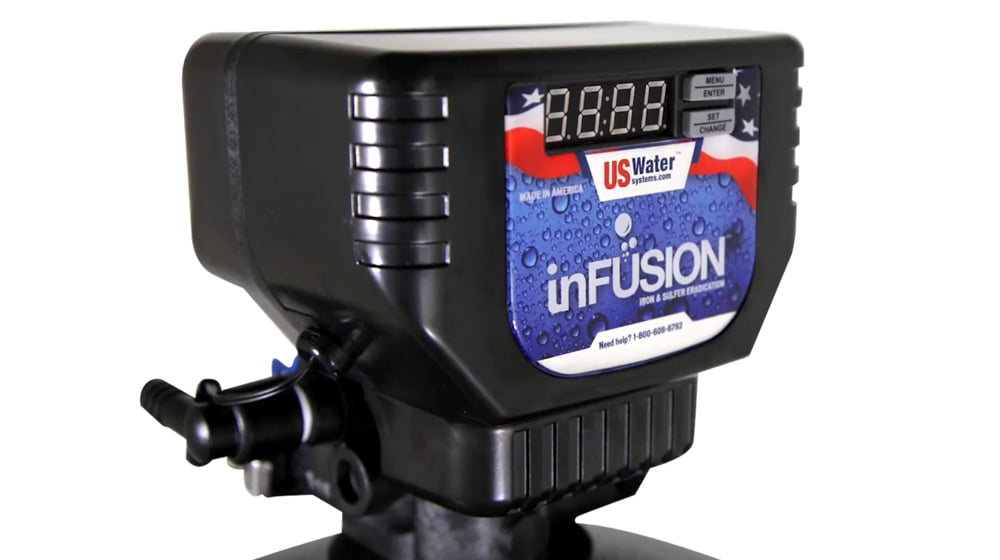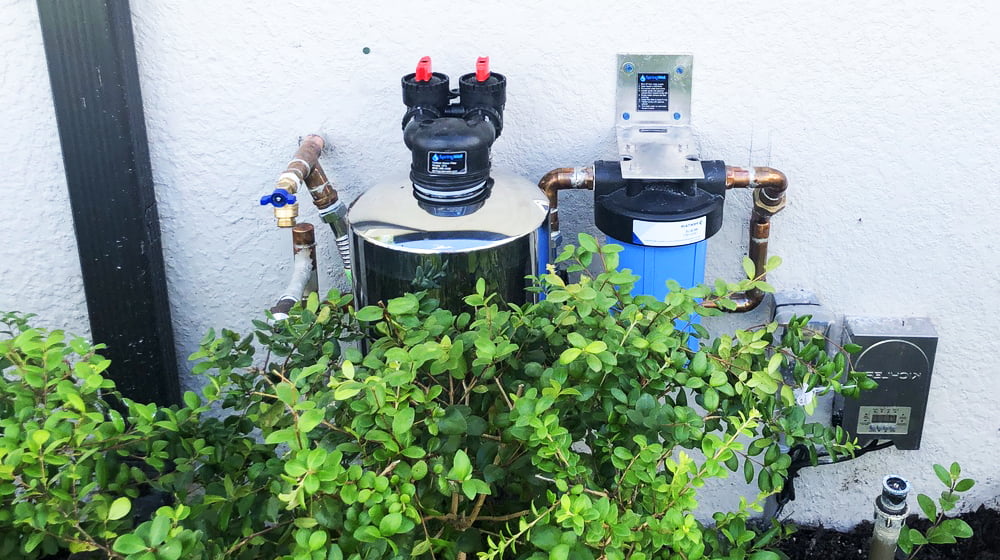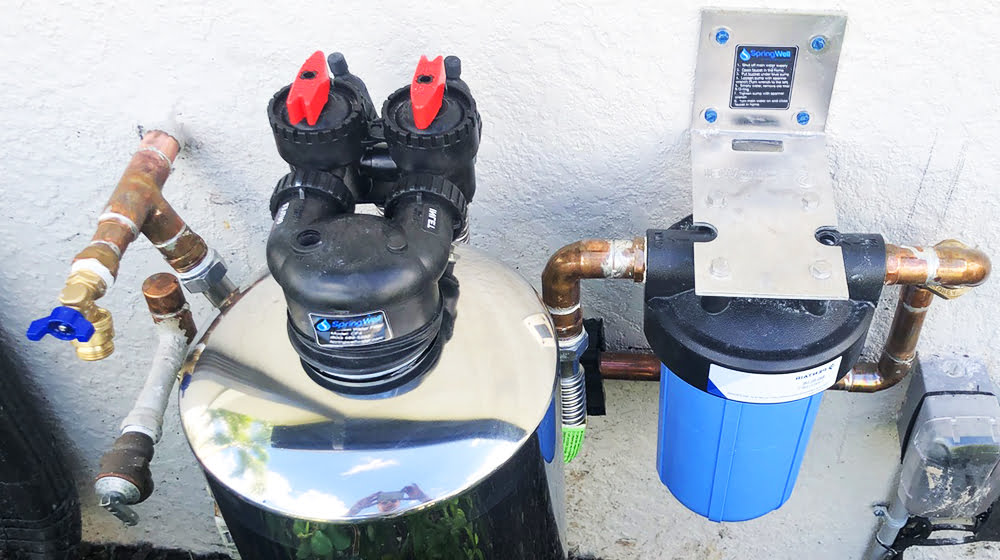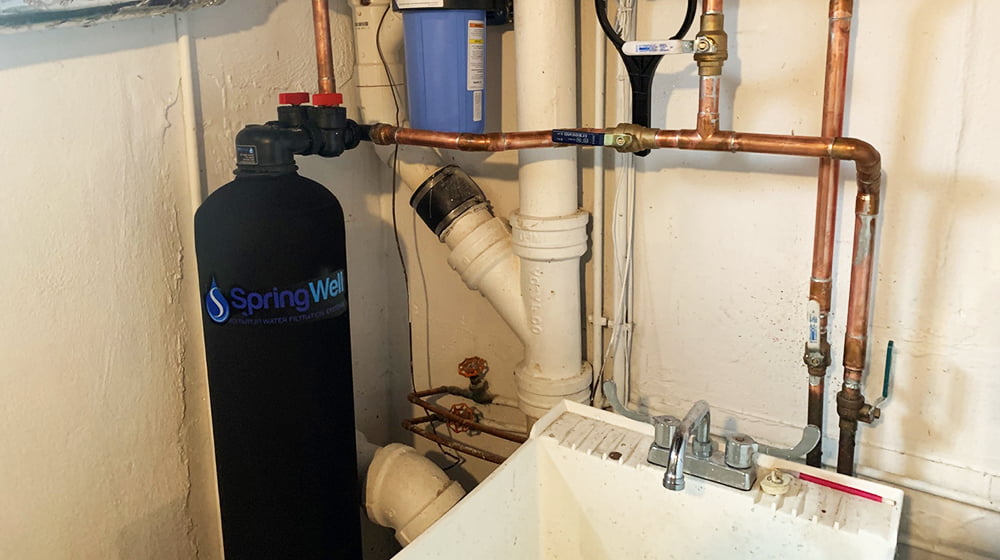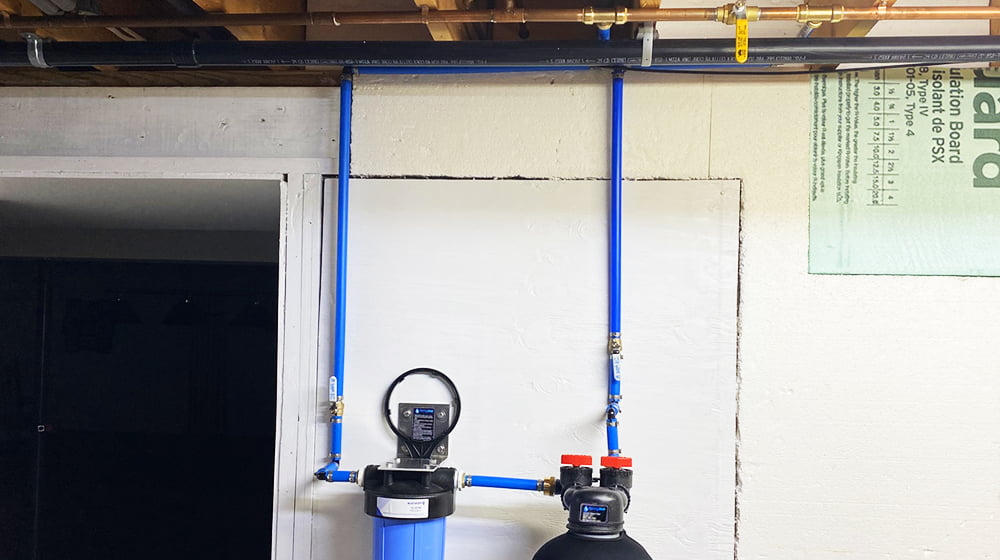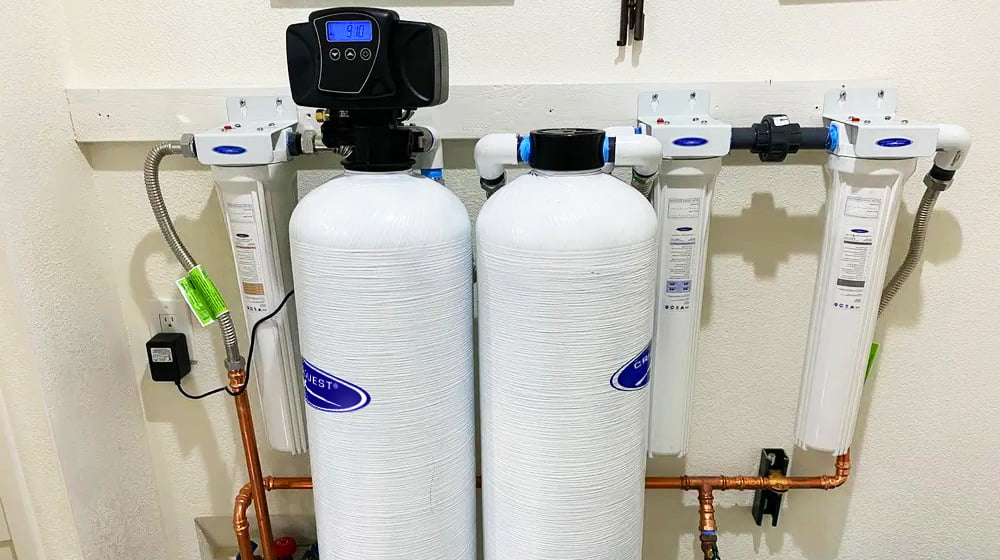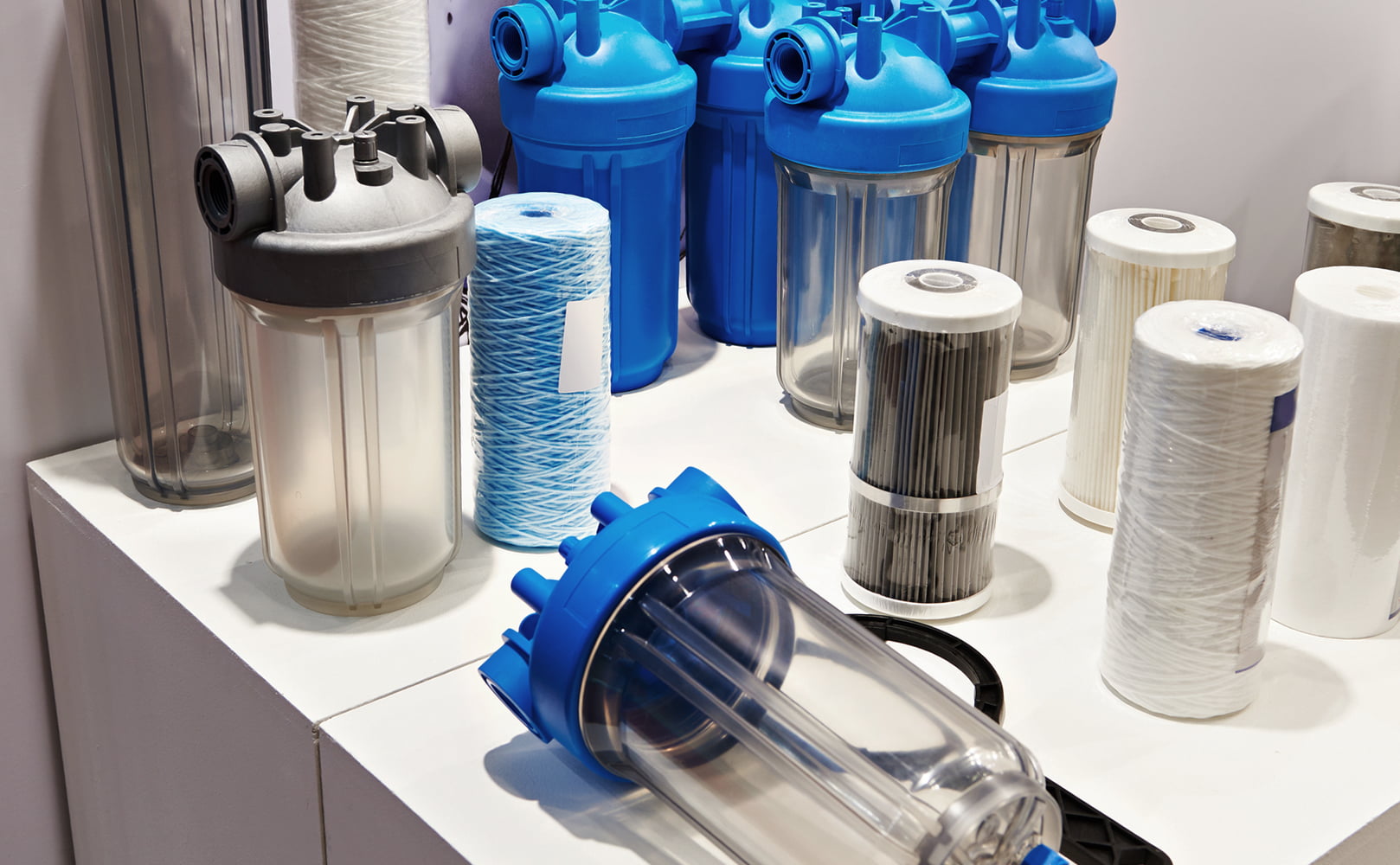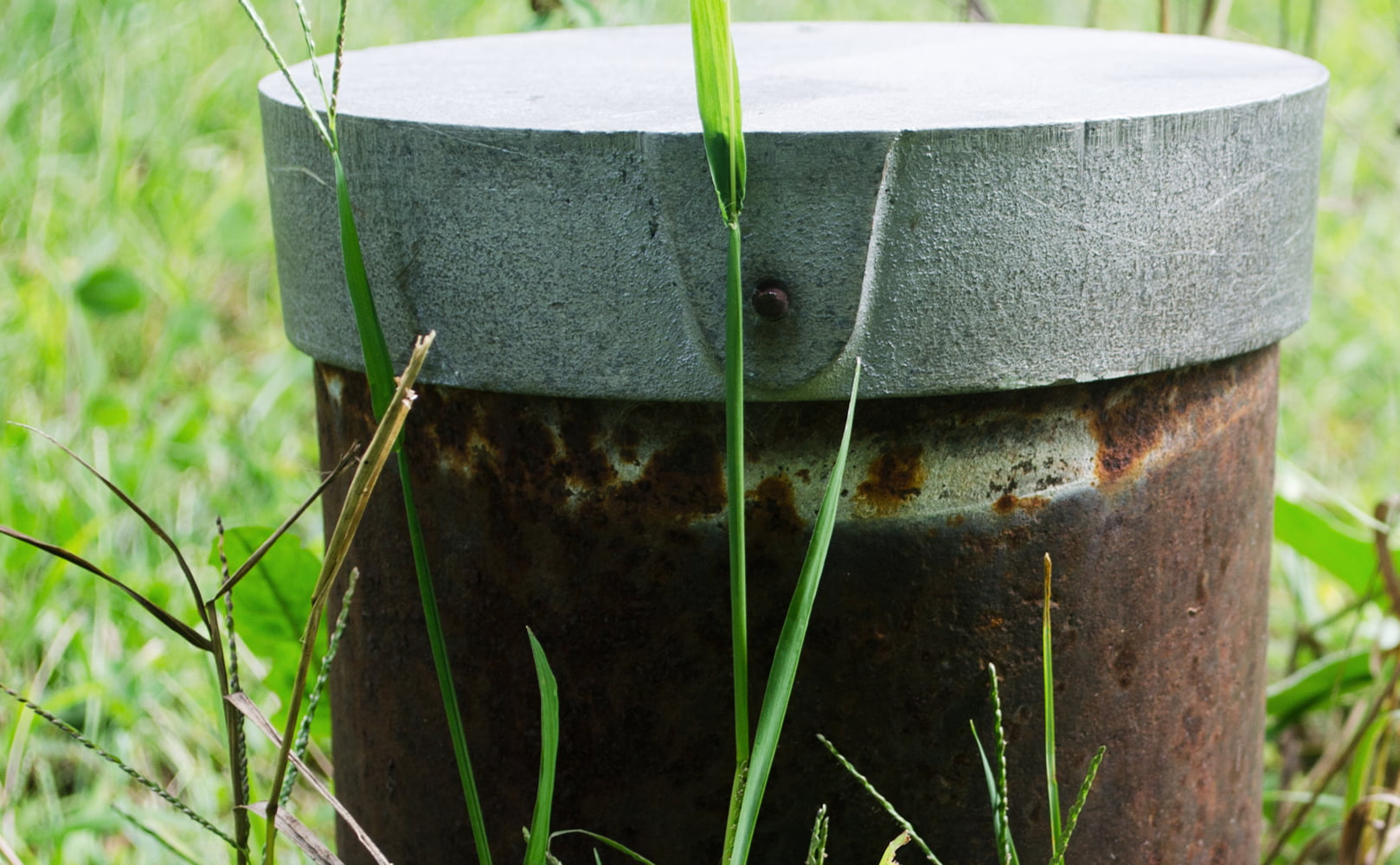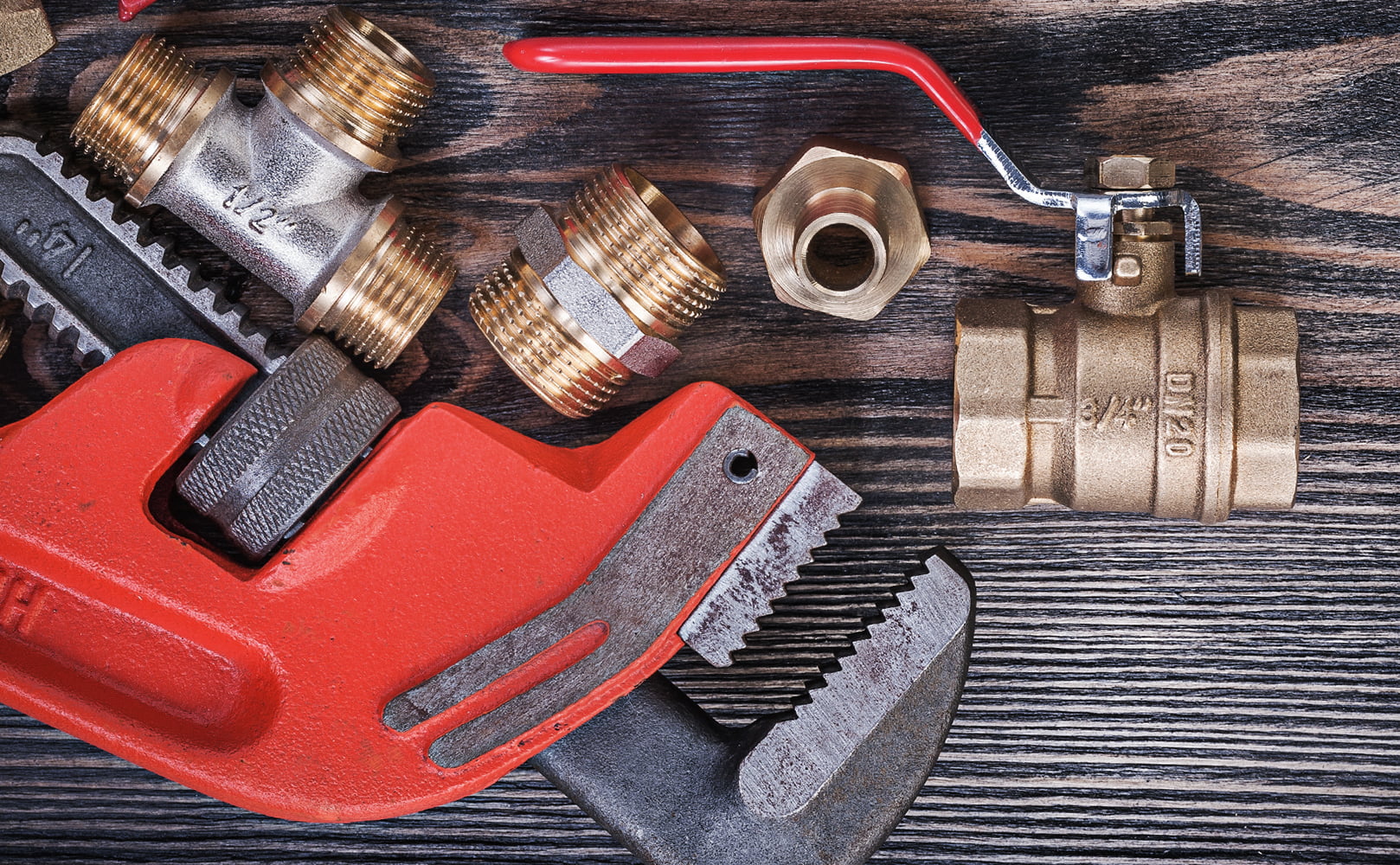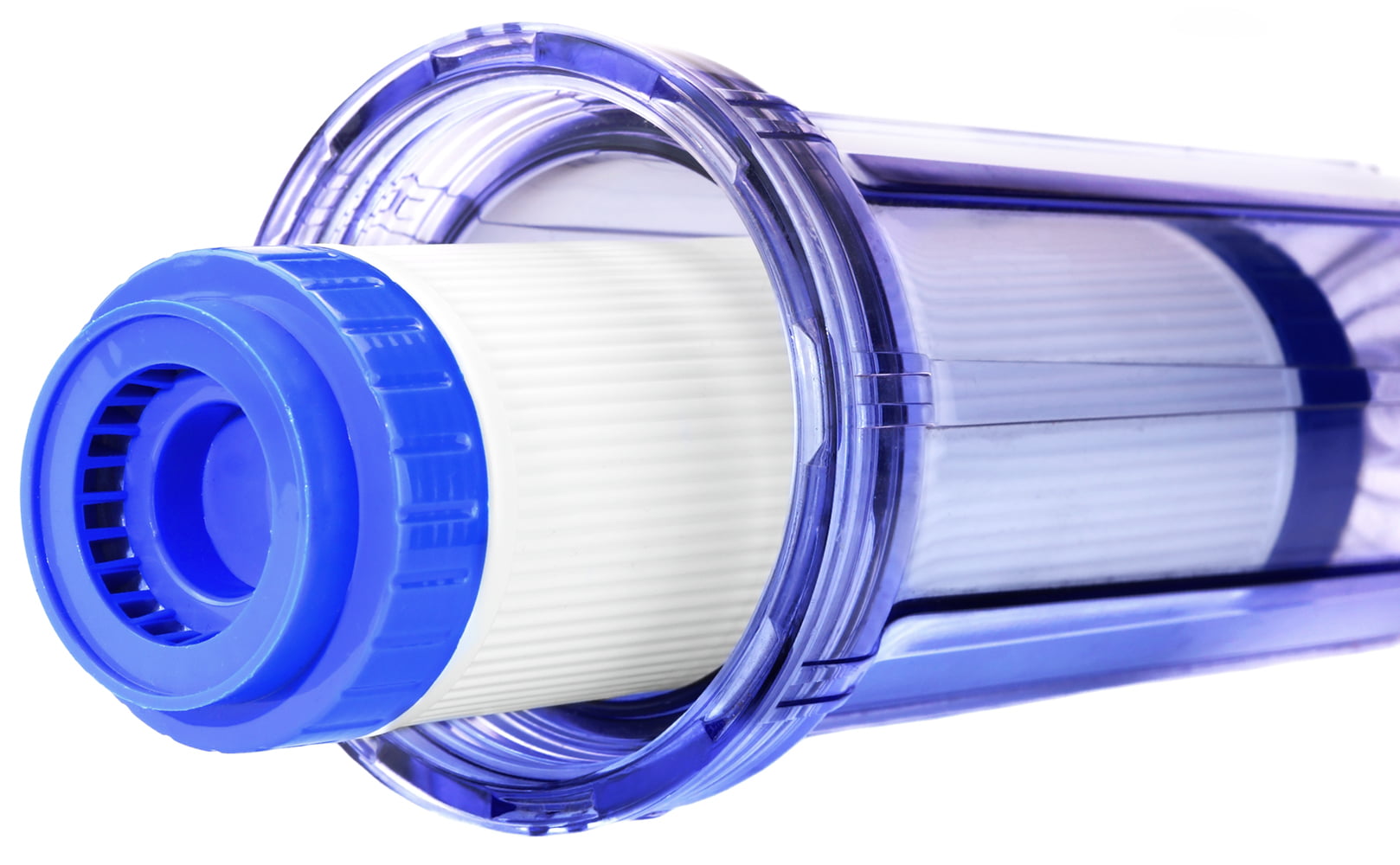10 Best Whole House Water Filters for Well Water (*Update 2024)
Written by: Alexandra Uta // Last Updated: Jan 31, 2024
This page may contain affiliate links. If you buy a product or service through such a link we earn a commission at no extra cost to you. Learn more.
Top Pick: What’s the Best Whole House Water Filter for Well Water?
The best whole house water filter for well water in 2024 is the SpringWell WS, because it effectively removes sediments, iron, manganese, and sulfur for up to 10+ years, it is easy to install and maintain (backwashes automatically), fast (12-20 gpm), and backed by a satisfaction guarantee and limited lifetime warranty.
There are so many whole house water filters for well water on the market. Not all of them are good and, depending on the filtration process, they are designed to address different well water problems. So, finding the right system for your needs is difficult.
To help you make the best buying decision, we’ve evaluated 35+ of the top whole house water filters for well water since this buying guide was first published on February 18, 2021. Thus, we’ve spent dozens and dozens of hours researching, reviewing, comparing, and ranking products + editing and upgrading this article.
No Time to Read? Check Our List of the Best Whole House Water Filters for Well Water
| Well Water Filters | Details | |
|---|---|---|
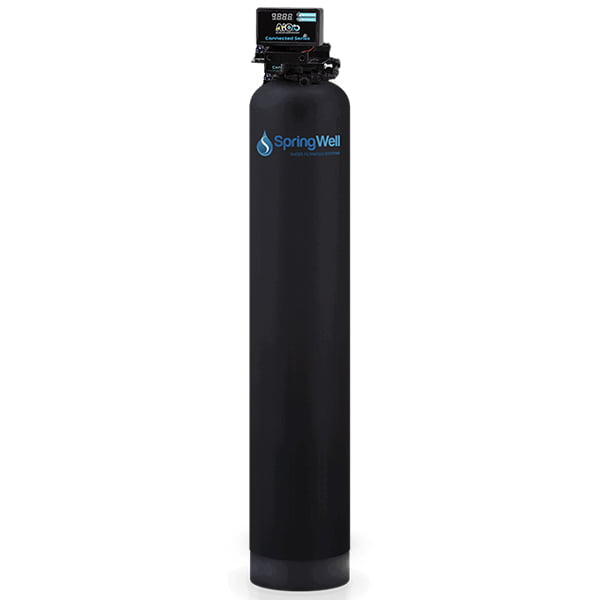 Best Overall: SpringWell WS |
Overall Rating: 5.0/5.0
Get 5% Off! Use Code: |
Price: $$$ Service Life: Up to 10+ Years Flow Rate: 12-20 gpm Annual Cost: – Warranty: Lifetime (Limited) Read Review: Click |
 The Runner-Up: US Water Systems Matrixx inFusion |
Overall Rating: 5.0/5.0
Get 5% Off! Use Code: |
Price: $$$ Service Life: 3-5 Years Flow Rate: 10-25 gpm Annual Cost: $200-400 Warranty: Lifetime, 10 Years, 5 Years Read Review: Click |
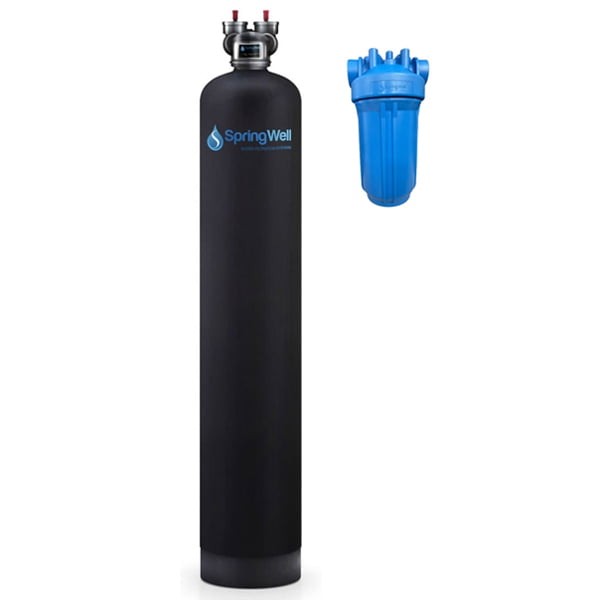 Best for Well Water with Chemicals: SpringWell CF |
Overall Rating: 5.0/5.0
Get 5% Off! Use Code: |
Price: $$ Gallon Capacity: 1 Million Gallons Flow Rate: 9-20 gpm Annual Cost: ~$40 Warranty: Limited Lifetime Read Review: Click Mike’s Video Review: Click |
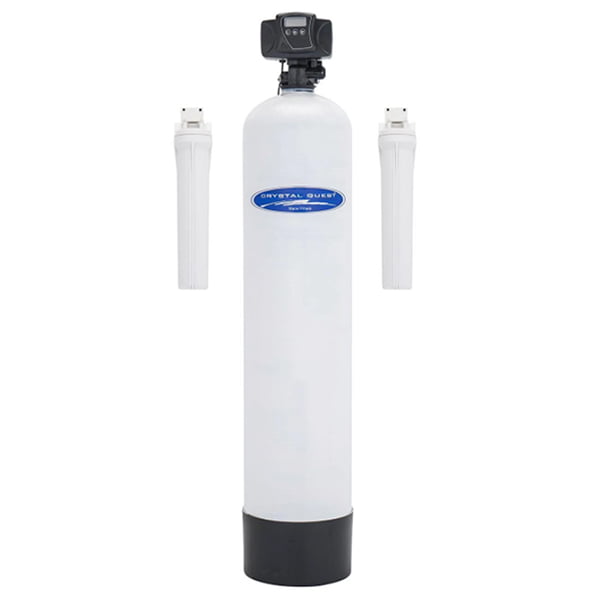 Ideal for Sediment Filtration: Crystal Quest |
Overall Rating: 5.0/5.0
Get 5% Off! Use Code: |
Price: $$ Service Life: 750,000-1,000,000 Gallons Flow Rate: 9-13 gpm Annual Cost: ~$60 Warranty: 1 Year Read Review: Click |
Whole House Well Water Filter Reviews
Our Top Picks
- SpringWell Water WS – Best Overall
- US Water Systems Matrixx inFusion – Runner-Up
- SpringWell Water CF – Best for Chemical Removal
- Crystal Quest – Best for Sediment
- Home Master HMF3SdgFeC – Best for Cartridge-Based Filtration
- SoftPro Iron Master AIO – Best for Very High Iron Levels
- iSpring WGB32BM
- Express Water 3 Stage
- Pentair PC1000-P – Best with NSF 42 Certification
- 3M Aqua-Pure AP903 – Best Budget Option
1. Best Overall: SpringWell Whole House Well Water Filter System
In our opinion, the best whole house water filter for well water in 2024 is the SpringWell WS.
It’s ideal for wells containing high levels of iron, manganese, and hydrogen sulfide, and will solve all your well water problems in one go. 5 stars!

SpringWell Whole House WS |
|
| Price: | $$$ |
| Filter Capacity: | Up to 10+ Years |
| Water: | 12-20 gpm |
| Annual Cost: | – |
| Warranty: | Limited Lifetime |
|
Overall Rating: 5.0/5.0
Get 5% Off! Use Code: |
|
Gallery
Other Specs
- Model: WS1, WS4
- Last Price: $2,204.09-$2,962.94
- Filter Process: Spin-Down Sediment, Air Injection Oxidation + Greensand
- Backwash Flow Rate: 5 gpm
- WxHxD: 10-13″x52-54″x10-13″
- Water Temp: 36-120 °F
- Water Pressure: 25-80 psi
- Water pH: 6.5-10
- Fitting: 1″
Key Features & Pros
- SpringWell WS whole house well water filter system eliminates staining of your laundry as well as in toilets, showers, sinks. Plus, it neutralizes rotten egg smell and makes your water taste way better.
- Air injection oxidation combined with greensand filter media remove a maximum combined of ferrous and ferric iron of up to 7 ppm, manganese up to 1 ppm, and hydrogen sulfide up to 8 ppm.
- Greensand also helps with radium and arsenic.
- Filter process is compatible with septic systems.
- Spin-down pre-filter traps large sediments (clean and reuse).
- Add optional UV filter stage for treatment of microbiologically unsafe well water systems.
- 2 system sizes:
- SpringWell Whole House WS1 provides 12 gpm water flow (1-4 bathrooms).
- Larger filter version: 20 gallons of water per minute is enough to supply homes with 4+ bathrooms.
- Process includes periodic backwashing of greensand to flush out all accumulated contaminants and daily air pocket reset. The electronic head unit manages both so you don’t have to worry about it.
- Electronic head can be programmed at the system or remotely via mobile device app.
- System is easy to install for do-it-yourselfers.
- Installation kit can be purchased as optional add-on.
- Detailed installation instructions and bypass valve are included.
- In most cases, there is absolutely zero maintenance required. The filter media lasts for as much as 10 or more years.
- System is backed by 6-month money-back guarantee.
- Manufacturer also provides limited lifetime warranty on valve, tank, media, and fittings.
Cons
- Metal fittings would have been nice.
Our Rating
- Filtering Performance: 5.0/5.0
- Filter Life: 5.0/5.0
- Price: 4.0/5.0
- Maintenance Cost: 5.0/5.0
- Overall: 5.0/5.0
Best for
The SpringWell WS is best for people who want a whole house water filter for well water that’s easy to install & service, and suited for removing iron, manganese, and sulfur.
→ Read Our Full SpringWell WS Review Here
2. The Runner-Up: US Water Systems Matrixx inFusion Iron and Sulfur Removal System
Alternatively to the SpringWell WS, we recommend the Matrixx inFusion iron and sulfur removal system by USWS.
Unlike the WS which uses air injection for pre-oxidation followed by greensand filtration, the Matrixx inFusion pairs hydrogen peroxide with catalytic activated carbon media. This powerful combination is designed for filtering very high levels of iron, manganese, and sulfur. What’s more, hydrogen peroxide injection is also highly effective against iron and sulfur bacteria!
Gallery
Other Specs
- Model: 081-MIF
- Last Price: $3,606.36-$4,146.36
- Filter Process: H2O2 + Carbon
- Backwash Flow Rate: 5-10 gpm
- WxHxD: 10-14″x54-65″x10-14″
- Water Temp: 39-100 °F
- Water Pressure: 20-100 psi
- Water pH: 6-9
- Fitting: 3/4″ or 1″ MPT
Key Features & Pros
- The chemical pump injects hydrogen peroxide (H2O2) into the water stream for pre-oxidation. Any iron, manganese, and sulfur oxidize instantly and precipitate from the solution. When the water gets in contact with the catalytic activated carbon media, all oxidized contaminants get trapped.
- Hydrogen peroxide is a very powerful oxidizer. Powerful enough to eliminate any iron and sulfur bacteria and other microorganisms.
- The filtration process also neutralizes odors.
- Compared to chlorination, there are no unwanted byproducts.
- Sediment, silt, sand, and rust are removed likewise.
- Your plumbing, fixtures, and appliances are protected from damage.
- During backwash, accumulated contaminants are rinsed from the filter media.
- Performed automatically every few days.
- A Vortech plate in the bottom of the tank increases backwashing efficiency for up to 30% water savings. And it prevents media channeling prolonging the life of the carbon.
- 4 sizes to choose from:
- 10 gpm peak water flow rate for 1 to 2 baths.
- 15 gpm designed for 2-3.5 bathrooms.
- 20 gpm is ideal for 4-6 baths.
- 25 gpm for 7 baths or more.
- Package includes everything you need: 15-gallon hydrogen peroxide tank, chemical injection pump, water meter, 5 gallons of NSF-approved H2O2 (OxiPro-7).
- The chrome tank protector is easy to clean.
- Installation is easy also thanks to detailed step by step instructions.
- Built-in bypass.
- Programming can be done in less than 2 minutes via smartphone. Free app also tracks water usage.
- No maintenance required.
- You get a lifetime warranty on the media tank, 10 years on the head valve, 5 years on the chemical injection panel.
Cons
- Expenses for hydrogen peroxide amount to $200-400 per year.
Our Rating
- Filtering Performance: 5.0/5.0
- Filter Life: 4.5/5.0
- Price: 4.0/5.0
- Maintenance Cost: 5.0/5.0
- Overall: 5.0/5.0
Best for
The USWS Matrixx inFusion is our second top pick for well water containing Fe, Mn or S.
3. Best Rated Whole House Water Filter for Well Water with Chemicals: SpringWell Water CF
In our opinion, the best water filtration system for well water with chemicals in 2024 is the SpringWell Water CF. It was designed for removing chlorine and chloramine, and various chemicals such as disinfection byproducts, pesticides, herbicides, and VOCs. That’s why the system is very often used with city water. However, it is equally compatible with well water as long as there isn’t too much iron and manganese that could clog the catalytic carbon filter bed.
One use case: Filtering excess water disinfectants that result from shock chlorination. The system also improves drinking water aesthetics by a lot. Definitely 5 stars!

SpringWell Water CF |
|
| Price: | $$ |
| Filtration Capacity: | 1,000,000 Gallons |
| Water: | 9-20 gpm |
| Annual Cost: | ~$40 |
| Warranty: | Lifetime (Limited) |
|
Overall Rating: 5.0/5.0
Get 5% Off! Use Code: |
|
Mike’s Video Review
Mike, one of our inhouse video content producers, has ordered, installed, and tested the SpringWell CF Whole House Water Filter in his own home – including lab testing for contaminant reduction rates. You cannot get more hands-on experience than that! Mike has documented the entire process and shares his findings the video below:
Other Specs
- Model: CF1, CF4, CF+
- Last Price: $1,016.44-$1,737.21
- Filter Process: Sediment Pre (5 Microns), Catalytic Carbon + KDF
- Filter Stages: 2
- WxHxD: 9-13″x52-58″x9-13″
- Water Temp: 36-120 °F
- Water Pressure: 25-80 psi
- Fitting: 1″-1.5″
Key Features & Pros
- Our top pick for well water treated with shock chlorination and water containing high levels of chemicals and organics.
- Greatly improves the taste and smell of water. Provides water safe to drink.
- 5-micron sediment filter traps dirt and other large particles which protects the rest of the filter system + your plumbing system and water-using home appliances.
- KDF media removes heavy metals and chlorine and controls the growth of bacteria, viruses, algae, and fungi.
- High quality, long-lasting catalytic carbon adsorbs many different types of well water contaminants including volatile organic compounds (VOCs), pesticides, herbicides, and TTHMs.
- Chlorine and chloramine reduction below the minimum detection level is guaranteed by manufacturer for 1,000,000 gallons of filtered or 6 years.
- Add optional UV filter stage for treatment of microbiologically unsafe well water.
- 3 filter versions available:
- CF1 whole house water filter system provides up to 9 gpm (used for 1-3 bathrooms).
- CF4: 12 gpm flow rate is ideal for homes with up to 4-6 bathrooms.
- CF+ delivers high flow of up to 20 gpm.
- Installation is easy if you are experienced with tools.
- Bypass valve and illustrated installation instructions are part of the package.
- An installation kit is optional.
- System maintenance is extremely low which is convenient. All you need to do is replace the sediment filter once or twice per year at minimum cost.
- 6-month money back guarantee allows you to return the product for a full refund.
- You get a limited lifetime warranty.
Cons
- We would have preferred metal fittings for durability reasons.
Our Rating
- Filtering Performance: 5.0/5.0
- Filter Life: 5.0/5.0
- Price: 4.0/5.0
- Maintenance Cost: 5.0/5.0
- Overall: 5.0/5.0
Best for
The SpringWell Water CF is best for people with a well water supply that contains chemicals like pesticides.
→ Read Our Full SpringWell CF Review Here
4. Best for Sediment in Well Water: Crystal Quest Whole House Filter
The Crystal Quest is another great setup only that this time the filter specializes on sediment removal. Of course, sediment can often be found in abundance in well water so designing a whole house well water filter for that purpose alone makes complete sense. 5 stars.

Crystal Quest Whole House Sediment Filter |
|
| Price: | $$ |
| Service Life: | 750,000-1,000,000 Gallons |
| Water: | 9-13 gpm |
| Annual Cost: | ~$60 |
| Warranty: | 1 Year |
|
Overall Rating: 5.0/5.0
Get 5% Off! Use Code: |
|
Gallery
Other Specs
- Model: CQE-WH-01259, CQE-WH-01260
- Last Price: $1,373.00-$1,776.00
- Filter Process: Sediment Pre (20 Microns), ChemSorb + KDF, Carbon Block
- Filter Stages: 3
- WxHxD: 10-12″x52-54″x10-12″
- Water Temp: 35-100 °F
- Water Pressure: 20-60 psi
- Fitting: 3/4″ or 1″
Key Features & Pros
- First, a 20-inch pre-filter removes larger sediment particles, silt, sand, and dirt.
- Granular ChemSorb media filters suspended solids down to 5 microns (nominal) in size. This improves water quality by a great deal, protecting your home’s entire plumbing system from harm.
- The ChemSorb filter granules are 100% natural Zeolite mineral ore.
- ChemSorb is lightweight and therefore resource-friendly. It doesn’t require much water when backwashing in order to release trapped sediment.
- Larger-sized granules create less water pressure loss and allow for deeper sediment penetration into the filter bed. This prevents caking and provides for longer runs between backwashing cycles.
- KDF filter media is added to stop bacteria growth.
- Finally, water flows through a 20-inch solid carbon block for chemical removal.
- Peak service water flow depends on which filtration system size you opt for:
- 1.5 cu. ft. system delivers up to 11 gpm (1-4 bathrooms).
- 2.0 cu. ft. system maxes out at 13 gpm (suited for 4-5 bathrooms).
- You can choose between stainless steel or fiberglass tanks.
- We would say the water filter is easy to install even without prior plumbing experience.
- Media is estimated to last up to 1,000,000 gallons. During its service life it requires zero maintenance. The additional filters last 1-2 years.
- Everything is warranted for 1 year.
Cons
- Nothing so far.
Our Rating
- Filtering Performance: 5.0/5.0
- Filter Life: 5.0/5.0
- Price: 4.0/5.0
- Maintenance Cost: 5.0/5.0
- Overall: 5.0/5.0
Best for
The Crystal Quest Turbidity whole house filter is best for well water with excess sediment levels.
5. Best for Cartridge-Based Filtration: Home Master HMF3SdgFeC Well Filter System
For people on well water that prefer a system based on filter cartridges we recommend the Home Master HMF3SdgFeC. Specifically designed for well supplies with moderate iron levels, it provides an entire home with clean, filtered water. 4.5 stars!

Home Master Three-Stage System |
|
| Price: | $$ |
| Water Filtering Capacity: | Up to 100,000 Gallons |
| Water: | 15 gpm |
| Annual Cost: | $260+ |
| Warranty: | 2 Years |
|
Overall Rating: 4.5/5.0
|
|
Other Specs
- Model: HMF3SdgFeC
- Last Price: $579
- Filter Process: Sediment (25-10-5-1 Microns), Iron Filter, GAC
- Filter Stages: 3
- WxHxD: 24″x25″x9″
- Water Temp: 40-100 °F
- Water Pressure: 20-90 psi
- Water pH: Ideally >7.0
- Fitting: 1″
Key Features & Pros
- No huge upfront investment required.
- Best well water filtration system of its kind. Users are highly satisfied with the results they get: No more iron staining, clean taste, and refreshing smell right after installation.
- First filter stage uses a high quality multi-gradient density sediment filter (25 – 10 – 5 – 1 micron nominal) to remove sand, rust and other particles from your private well water. Also takes out harmful cyst and bacteria – think E. Coli.
- According to manufacturer, multi-gradient density filters have three times the dirt holding capacity of similar sized sediment filters.
- Next comes an iron filter cartridge. It can filter up to 3 parts per million ferric and ferrous iron from well water, and also reduces hydrogen sulfide and manganese.
- Sulfur and manganese reduce the service life of the filter at 2-6 times the rate of iron.
- Granular activated carbon filter (20 microns nominal) gives the water a final polish. It eliminates harmful chemicals including herbicides, pesticides, chlorine, VOCs, and any remaining tastes and odors.
- Up to 15 gpm clean water flow should be sufficient for homes with up to 4-5 bathrooms.
- As with most whole house filter systems, the installation is relatively simple.
- Maintenance requirements are conveniently low. Required filter replacement frequency depends on the condition of your well water and your daily water usage. Expect that you need to change filters twice per year.
- Home Master offers to check your water report and give treatment recommendations for free. Overall customer support is great from knowledgeable staff members.
- You get a 2-year warranty.
Cons
- Filter changes aren’t cheap.
- No built-in bypass valve.
Our Rating
- Filtering Performance: 4.5/5.0
- Filter Life: 4.0/5.0
- Price: 5.0/5.0
- Maintenance Cost: 4.0/5.0
- Overall: 4.5/5.0
Best for
The HMF3SdgFeC is best if you want a cartridge-based filter system removing dirt, iron, and chemicals – think pesticides.
6. Best for Very High Iron Content: SoftPro Iron Master AIO Water Filtration System
Another solid well water filtration system for high levels of iron is the SoftPro Iron Master AIO by Quality Water Treatment. The whole house water filtration system can handle extreme levels of iron, manganese, and sulfur with ease. And the pricing is good, too!
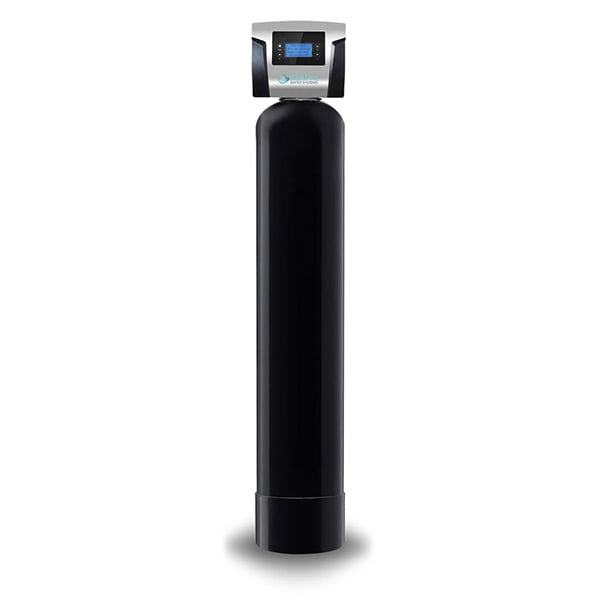
SoftPro Iron Master AIO |
|
| Price: | $$ |
| Service Life: | 5-10 Years |
| Water: | Up to 6-12 gpm |
| Annual Cost: | – |
| Warranty: | Lifetime, 7 Years |
|
Overall Rating: 4.5/5.0
|
|
Other Specs
- Model: Iron Master AIO
- Last Price: $1,519-$1,919
- Filter Process: Air Induction + Katalox
- Backwash Flow Rate: 5-10 gpm
- WxHxD: 10-12″x44-54″x10-12″
- Fitting: 1″
Key Features & Pros
- SoftPro Iron Master AIO Water Filtration System uses air induction technology in combination with Katalox to remove iron (up to 30 ppm), manganese (up to 7 ppm), and hydrogen sulfide (up to 5 ppm).
- Air injector uses oxygen in air to increase filtration effectiveness.
- Filtration process is fully automated by control valve. No work required from your end.
- Setup comes in 3 different sizes:
- 1.0 cu. ft. system filters a maximum of 6 gallons of well water a minute (for 1-2 bathrooms).
- 1.5 cu. ft. system can provide up to 9 gpm (1-3 bathrooms).
- 2.0 cu. ft. system peaks at 12 gpm (up to 4 bathrooms).
- Simple to install.
- Quick-connect hoses can be added as a free bonus. They make system installation even simpler.
- Katalox bed is estimated to last 5 to 10 years, depending on well water quality and your water usage.
- The Iron Master comes with a 60-day trial period. You can test the well water filter system risk-free. If you are not satisfied, just send it back and receive a refund.
- Quality Water Treatment’s limited lifetime warranty covers SoftPro Elite control valve and Iron Master tank. The circuit board is warranted for 7 years.
Cons
- No complaints so far. We will update this section of need be.
Our Rating
- Filtering Performance: 4.5/5.0
- Filter Life: 5.0/5.0
- Price: 4.5/5.0
- Maintenance Cost: 5.0/5.0
- Overall: 4.5/5.0
Best for
The Iron Master by SoftPro is best for extremely high iron levels of up to 30 ppm.
7. iSpring WGB32BM Big Blue 3-Stage Whole House Water Filtration Systems
The iSpring WGB32B 3-Stage comes in a few different versions designed for different water contamination issues. For well water, we recommend either the iSpring WGB32BM for iron and manganese reduction, or the iSpring WGB32B-KS which removes a broad range of heavy metals commonly found in wells.

iSpring WGB32BM Big Blue Whole House System |
|
| Price: | $ |
| Filter Capacity: | 100,000 Gallons |
| Water: | 4-8 gpm |
| Annual Cost: | ~$300 |
| Warranty: | 1 Year |
|
Overall Rating: 4.0/5.0
|
|
Other Specs
- Model: WGB32BM
- Filter Process: 5-Micron PP Sediment Pre, Carbon Block, Iron Filter
- Filter Stages: 3
- WxHxD: 24.5″x28″x8″
- Water Temp: 40-100 °F
- Water Pressure: 25-100 psi
- Water pH: 5.8-8.6
- Fitting: 1″ NPT
Key Features & Pros
- As a whole house well water filter system using filter cartridges the price tag of both iSpring units is low.
- Both system versions use a sediment pre-filter rated at 5 microns to remove dirt, colors and cloudiness.
- The following coconut shell carbon block filter is used to remove chlorine taste and odor, organic contaminants, and chemicals.
- iSpring WGB32BM features iron and manganese filter. It can remove up to 3 ppm iron from well water and an additional 1 ppm manganese. Sulfur will be reduced, too.
- iSpring WGB32B-KS uses a third filter stage (post-filter) that combines granular activated carbon with KDF media. It effectively removes lead, mercury, hydrogen sulfide, pesticides, herbicides, and more.
- The 20″ x 4.5″ Big Blue filters are standard sized, meaning you can try out different filter types or purchase off-brand models in order to save money.
- About 100,000 gallons filter life – there isn’t too much maintenance required.
Cons
- Service flow rate for the iSpring WGB32BM is 4-8 gpm which is too low for larger homes.
- Replacement filter costs start to add up over time. Also, due to issues with outgoing water pressure some reviewers reportedly had to change their filters much more frequently than advertised adding to the expenses.
- No bypass valve and lacking information regarding NSF certifications.
Our Rating
- Filtering Performance: 4.0/5.0
- Filter Life: 4.0/5.0
- Price: 4.5/5.0
- Maintenance Cost: 3.5/5.0
- Overall: 4.0/5.0
Best for
The iSpring WGB32BM is best for people who like the idea of customization combined with a low price tag.
8. Express Water 3 Stage Whole House Water Filtration System
The Express Water 3-stage whole house water filter is a universal talent. Tested to remove 80+ contaminants from well water it is one of the most sought after water filters on Amazon – also because the initial price tag is much smaller than the competition’s.

Express Water 3 Stage Filtration System |
|
| Price: | $ |
| Filter Capacity: | 100,000 Gallons |
| Water: | 15 gpm |
| Annual Cost: | ~$170-340 |
| Warranty: | 1 Year |
|
Overall Rating: 4.0/5.0
|
|
Other Specs
- Model: WH300SCKS
- Filter Process: 5-Micron PP Sediment Pre, Catalytic Carbon + KDF85, Carbon Block
- Filter Stages: 3
- WxHxD: 23.5″x29.25″x8.5″
- Water Temp: 40-100 °F
- Water Pressure: 45-80 psi
- Fitting: 1″ Female NPT
Key Features & Pros
- Uses 3 stages of filtration. First, a sediment pre-filter traps floating particles, including dirt, silt, and rust, sized 5 microns or larger. This prevents the subsequent filter stages from clogging.
- Second stage uses a carbon-KDF filter stage for the removal of heavy metals – think iron, chromium 6, and lead. KDF also helps against microorganisms like bacteria and viruses.
- Lastly comes an activated carbon filter block to remove chlorine taste and odor, chemicals, and VOCs.
- 15 gpm flow rate is enough water to supply homes with 4 to 5 bathrooms.
- Hooking up the unit is straightforward. You can let it stand freely on the stainless steel frame or mount it to a wall.
- Pressure gauges before and after each filter stage simplify system maintenance. As soon as one of the filter stages causes a noticeable drop in water pressure it’s time for a new cartridge.
- Each stage has a filtration capacity of 100,000 gallons of water or 6 to 12 months, whichever comes first.
- Pressure release buttons make the filter changes a lot easier.
- 1-year warranty included for peace of mind.
Cons
- The Express Water is for basic well water filtration. Don’t expect outstanding results.
- As with iSpring whole house filters, cartridges may clog up faster than advertised which adds to the maintenance cost.
- No built-in bypass valve.
Our Rating
- Filtering Performance: 4.0/5.0
- Filter Life: 4.0/5.0
- Price: 4.5/5.0
- Maintenance Cost: 3.5/5.0
- Overall: 4.0/5.0
Best for
The Express Water is best if you like additional features such as pressure gauges but don’t want to spend a whole lot of money.
9. Best System with NSF 42 Certification: Pentair PC1000-P Whole Home Water Filter
The Pentair PC1000-P whole home water filter system is similar to the SpringWell Water CF. It’s great for removing chlorine and chemicals, and also improves the taste and odor of well water.

Pentair Whole House PC1000-P |
|
| Price: | $$ |
| Filter Capacity: | 1,300,000 Gallons |
| Water: | 12 gpm |
| Annual Cost: | ~$30-40 |
| Warranty: | 1 to 5 Years |
|
Overall Rating: 4.5/5.0
|
|
Other Specs
- Model: PC1000-P
- Filter Process: 5-Micron Sediment Pre, Catalytic Carbon + KDF
- Filter Stages: 2
- WxHxD: 23.5″x29.25″x8.5″
- Water Temp: 36-120 °F
- Water Pressure: 25-80 psi
- Water pH: 6-11
- Fitting: 1″ NPT
- NSF Certifications: 42 (Chlorine Taste and Odor), 61, 372
Key Features & Pros
- Provides great-tasting and clean drinking water at every tap in your home.
- Clean shower water promotes healthy hair and skin. Indoor air quality will improve, too.
- A 5-micron sediment pre-filter removes larger particulates. Protects the rest of the water filtration system from clogging.
- High-grade catalytic granular coconut shell carbon provides for the highest filtration capacity and effectiveness, meaning broader contaminant removal.
- Pentair guarantees the removal of chlorine + chloramine below the minimum detection level for 1.3 million gallons or 5 years.
- Chlorine taste and odor reduction is NSF/ANSI certified (Standard 42).
- Bacteriostatic KDF-55, a mixture of copper and zinc, stops microorganisms from accumulating inside the tank and further reduces chlorine as well as lead, nickel, mercury, chromium, and other dissolved heavy metals.
- All in all, chemical and non-chemical well water contaminants – some with potential health effects – are removed by the whole house filter. The end result is much cleaner and much healthier (drinking) water.
- 12 gpm flow rate is enough for large homes with 4 to 6 bathrooms.
- Smaller system version:
- 650,000 gallons or 5 years filtration capacity at 8 gpm (1-3 bathrooms)
- Large media tank is wrapped in stainless steel for longevity.
- Except for priming the carbon filter bed, the system is no more difficult to install than any of the filters reviewed above.
- Comes pre-assembled and pre-loaded.
- Built-in bypass valve.
- Maintaining the system is easy. All you need to do is replace the pre-filter on time. Costs are negligible.
- 1-5-year warranty for peace of mind.
Cons
- Media priming seems more complicated that it needs to be.
- A handful of people complained about a leaking system and issues with customer service.
Our Rating
- Filtering Performance: 4.5/5.0
- Filter Life: 5.0/5.0
- Price: 4.0/5.0
- Maintenance Cost: 5.0/5.0
- Overall: 4.5/5.0
Best for
Pentair’s PC1000-P whole house well filter system is best if you insist on an NSF standard 42 certification for chlorine removal.
10. Best for Low Budget: Aqua-Pure AP903 Whole House Water Filter System
In our final review, we’ll take a look at the Aqua-Pure AP903 by 3M. It’s not our favorite filter but certainly a solid alternative for people on a small budget.
We see the real value of the single-stage filtration system in improving the aesthetics of city water, but it works for wells, too, provided that it’s fairly clean already.
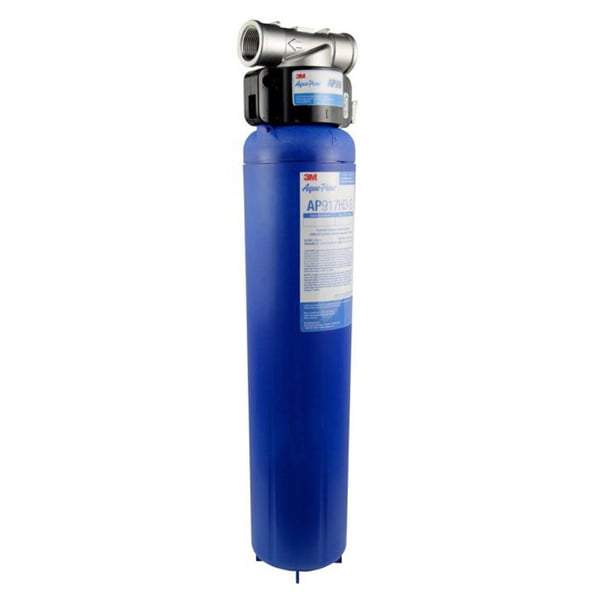
Aqua-Pure AP903 |
|
| Price: | $ |
| Water Filtering Capacity: | 100,000 Gallons |
| Water: | 20 gpm |
| Annual Cost: | ~$250 |
| Warranty: | 1 to 25 Years |
|
Overall Rating: 3.5/5.0
|
|
Other Specs
- Model: 3M Aqua-Pure AP903
- Filter Process: 5-Micron Sediment, Carbon Block
- WxHxD: 4.7″22.3″4.7″
- Water Temp: 40-100 °F
- Water Pressure: 20-125 psi
- Fitting: 1″ FNPT
- NSF Certifications: 42 (Nominal Particulate Reduction, Class III)
Key Features & Pros
- 5-micron nominal carbon block filtration combined with non-woven pleat media filter sediments, chlorine, and chemicals. On the one hand, this will improve the taste of your drinking water. On the other hand, it helps home appliances to last longer.
- High flow rate of up to 20 gpm is ideal for large homes.
- The 304 stainless steel head is corrosion resistant and thus provides for a long service life without affecting water taste.
- Easy installation due to slim design. The 3M Aqua-Pure fits in any corner.
- Filter replacement is super easy. All it takes is a quarter turn to remove the old filter cartridge and another quarter turn to install the new – no tools required.
- The head valve is warranted for 25 years.
Cons
- Some people have to replace the filter cartridge more often than advertised. They don’t even come close to the 100,000 gallons of filtered water or 12 months as specified by 3M. Maybe that’s due to high total dissolved solids levels.
- Of course, replacing the filter at such frequency doesn’t make much sense. Adding one or more pre-filter stages makes sense.
Our Rating
- Filtering Performance: 3.5/5.0
- Filter Life: 4.0/5.0
- Price: 4.0/5.0
- Maintenance Cost: 3.5/5.0
- Overall: 3.5/5.0
Best for
The AP903 whole house filter system is the best choice for everyone on a very tight budget.
Comparison List
(Mobile Hint: Swipe to Scroll)
| Model | Price | Filtration Capacity | Filter Media | GPM | Annually | Warranty | Additional Info |
|---|---|---|---|---|---|---|---|
| SpringWell Whole House WS | $$$ | Up to 10+ Years | Spin-Down Sediment, Air Injection Oxidation + Greensand; UV Light Filter Optional for Killing Pathogens Including E. Coli, Cryptosporidium, and Giardia | 12-20 | – | Life (Limited) | |
| USWS Matrixx inFusion | $$$ | 3 to 5 Years | H2O2 + Carbon | 10-25 | $200-400 | 5 Years to Life | |
| SpringWell Whole House CF | $$ | 1-Million Gallon | Sediment Pre (5-Micron), Catalytic Carbon + KDF; Optional UV Filter Eliminates Pathogenic Contaminants Including E. Coli, Cryptosporidium, and Giardia | 9-20 | ~$40 | Limited Lifetime | |
| Crystal Quest ChemSorb | $$ | 4-6 Years | Sediment Pre (20-Micron), ChemSorb + KDF, Carbon Filter Block | 9-13 | ~$60 | 1 Year | |
| Home Master Whole House Filtration System | $$ | Up to 100,000 Gallons | Multi-Gradient Sediment, Iron Filter, GAC | 15 | $260+ | 2 Years | |
| SoftPro Iron Master AIO | $$ | 5-10 Years | Air Induction + Katalox | Up to 6-12 | – | 7 Years to Life | |
| iSpring WGB32BM | $ | 100,000 Gallons | 5-Micron Sediment Pre, Carbon Filter Block, Iron Filter | 4-8 | ~$300 | 1 Year | |
| Express Water 3 Stage | $ | 100,000 Gallons | 5-Micron Sediment Pre, Catalytic Carbon + KDF85, Carbon Block Filter | 15 | ~$170-340 | 1 Year | |
| Pentair Whole House PC1000-P | $$ | 1,300,000-Gallon | 5-Micron Sediment, Catalytic Carbon, KDF | 12 | ~$30-40 | 1 to 5 Years | |
| 3M Aqua-Pure AP903 | $ | 100,000-Gallon | 5-Micron Sediment, Carbon Block | 20 | ~$250 | 1-25 Years |
Buying Guide: How to Choose the Whole House Well Water Filtration System That’s Best for You
The following are key features worth considering when shopping for a whole house water filter for well water. They will help you choose the right on for your needs and budget.
Test Your Private Well Water Quality
Do you even need a whole house water filter? And if so, which type is best suited for your well supply? The short answers is: It depends on your water conditions. This is why you need to test your water quality carefully before you do anything else.
You should determine the exact contaminants present in your water and their concentrations. And it can make sense to measure water pH, hard water minerals, and overall TDS (total dissolved solids).
Armed with these parameters, you can measure the various whole house water filters on the market against your requirements and compare them to one another.
By the way, in our opinion the best way to test your well water quality is by sending a sample to an independent laboratory (to these guys for example). The professional staff can then do a thorough analysis and provide you with everything you need to know.
Of course, you could also do the testing yourself using a simple water test kit sold by hardware stores. The reason why we don’t recommend this approach is because the testing lacks accuracy. Also, you will only be able to test for a narrow range of common contaminants.
Whole House Filtration System Types
In a nutshell, most whole house water filter systems use some sort of carbon and maybe a sediment filter to remove the most common water contaminants. These include chlorine/chloramine and their disinfection byproducts, a handful of heavy metals, and chemicals like herbicides, pesticides, and industrial solvents. Catalytic and regular activated carbon is also great for improving the taste and smell of water.
That said, carbon and sediment filtration is a good start, but your well water might require a different kind of treatment.
If you are dealing with the different forms of iron, for example, you need a specialized iron filter. Usually, this type of well filter is also effective against manganese and sulfur. All three contaminants are commonly found in wells.
At higher levels, pre-oxidation of the iron may be required. This is often achieved through air injection. Other methods include ozonation and chlorine injection. The pre-oxidation is then followed by specialized filtration media such as greensand or Katalox.
KDF media (copper-zinc alloy) can be used to control bacteria, viruses, and other microorganisms. Above that, it helps the chlorine reduction and also filters heavy metal content.
It’s also quite possible that all you need is a sediment filter to trap suspended solids. Sediment filters are either cartridge-based or use a large media tank.
Last but not least: UV filter stages. A UV filter is used to kill the various kinds of pathogens that can live in well water. Most common are bacteria, fungi, viruses, and cyst. UV light messes with their DNA so they cannot reproduce.
Filter Cartridges
We can also distinguish between cartridge-based whole house water filters and those using a large tank filled with granular filter media. The main difference is that whole house cartridge water filters cost less upfront, but expenses for replacement filters can start to add up quickly. Whole house filters that feature a large media tank require a higher initial investment, but less attention and money once installed.
Water Flow Rates
The United States Environmental Protection Agency estimates that “the average American family uses more than 300 gallons (…) per day at home. Roughly 70 percent of this use occurs indoors”. (Source)
70% of 300 gallons equals 210 water gallons that the average household uses in a single day. This incredibly huge amount of water can further be broken down into:
- 24% (50.4 gallons) for toilet flushing
- 20% (42 gallons) for showering
- 19% (39.9 gallons) for taps and faucets
- 17% (35.7 gallons) washing clothes
- 12% (25.2 gallons) wasted through leaking
- 8% (16.8 gallons) for other uses
First of all, this is a lot of water. But let’s also think about how much water you use when, because this becomes important for sizing a well water filter. After all, you don’t want to end up with a system that’s too small causing an occasional drop in water pressure and flow when you open multiple water outlets at the same time.
Quite the contrary: A whole home water filter needs to be able to process enough filtered even at times of peak use. One scenario that we like to use is on a regular morning when your family is getting ready for the day. Showers and faucets are running, someone flushes the toilet, and you start the washer.
Bottom line: Make sure to estimate your water consumption in gallons per minute at times of peak consumption.
As a family of four, we recommend to go with at least 8 (10) gpm. Large families living in a large home can easily use 15 gpm.
Micron Ratings
Sediment filters and some carbon filters are rated by the size of the smallest particles they can remove. For carbon filters, this rating is nominal and therefore less reliable than absolute ratings.
For example: A sediment filter rated at 10 microns means it can remove all suspended solids sized 10 microns or larger. Other common micron ratings are 50, 25, 5 and 1. Ultrafiltration cartridges can even reduce contaminants of submicron size.
Simply put, smaller micron rating means more contaminants can be removed. But there is a dilemma: Very fine filters tend to reduce water pressure and clog up quickly. Therefore, a good balance between usability and filtration effectiveness is key.
Filter Service Life
Depending on the type, whole house filter cartridges can last between 2 or 3 months and up to 1 year. The filter life of large media beds can often reach more than a decade.
A long filter life has the obvious advantage that maintenance is required less often which also keeps cost at a minimum.
Installation Space
Well or city water – a whole house filter needs to be installed at the main water line of your home. Most systems are larger than you’d think so make sure that you have sufficient space at the installation sight.
Budget
As mentioned before, POE filter systems using cartridges are more affordable at purchase but the cost for new replacement filters adds up quickly. For POE systems using a large media bed it’s the exact opposite.
Another cost factor is installation. Expect at least a few hundred dollars extra in fees, unless you are a DIYer and can connect the system yourself.
More on Well Water Filtration Systems
What Is a Whole House Water Filter for Well Water?
A whole house well water filter system filters the water from your private well before its distribution throughout your home.
Because well water is raw water and, unlike tap water, doesn’t receive any pre-treatment, a whole house water filtration system is a must for well owners. This is especially the case if you are planning on drinking the water.
Most importantly, a sophisticated filtration system will protect your health against harmful chemicals, pathogens, and metals. Another reason to add a whole house water filter for well water to your home is that filtered, clean water tastes and smells much better. Removing sediments also helps your plumbing system and water-using home appliances.
Since we are talking about POE filters, installation at the main water line is required. This can be done by yourself or a professional installer.
Maintaining most whole house filtration systems is simple. You just need to remember to replace filters in due time.
Why Do I Need a Well Water Filter?
All municipal water goes through various stages of treatment to guarantee consumer protection. This does in no way apply to most private wells. This is why well water may contain a whole plethora of harmful contaminants and those that affect water smell and taste. It is your responsibility as a well owner to make sure that the water you and your family use on a daily basis is clean and healthy.
On top of that, clean well water does not damage appliances like water heaters and provides for an extended service life.
Sources of Contamination
Well water contamination can originate from natural sources or it can be man-made.
- Bacteria, viruses, and other pathogens in well water usually originate from animal waste (farming) or human sewage (i.e. leaking waste storage tank or septic field) and are therefore man-made. The pathogens trickle into the earth entering our groundwater or are washed into nearby water sources as part of rainwater run-off or snow melt. When ingested, they can cause diarrhea which is rather harmless. But also more serious diseases can be transmitted this way.
- The mining and oil industry are the two main contributors to heavy metal contamination of our water sources. Another common contamination source for heavy metals in wells can be a home’s plumbing system. And even natural deposits can be the root of the problem. Metals most commonly found in well water are iron, manganese, and arsenic. Chromium 6 and lead can be problematic, too – and pose a serious health threat.
- Agriculture in particular is the reason why more and more chemicals are ending up in our wells. Health consequences are manifold: Liver damage, impairment of the male and female reproductive system, cancer.
How Whole House Water Filtration Systems for Well Water Work + Contaminant Removal
As the name suggests, this type of water filter processes all the incoming water in your home. Opposed to point-of-use filtration, point-of-entry filtration gives you access to filtered water at every single outlet: Bathroom taps, showers, kitchen faucet – you name it.
The exact process each filter uses can be different from model to model.
- Most start with a simple sediment pre-filter. This is to trap large impurities that may otherwise clog the following filter stages. Some whole house water filter systems even focus on sediment filtration alone.
- The main treatment process might combine two types of filter media: Catalytic activated carbon and KDF. The mixture is used to removal chlorine, heavy metals, and various organic chemicals from water, among other things. Carbon is also perfectly suited for improving water aesthetics.
- Or a filter may use pre-oxidation followed by greensand for the removal of iron, sulfur, and manganese.
- Activated alumina and bone char can be used to reduce naturally occurring fluoride.
- Installing a UV filter is important if your water testing showed any kind of viruses, bacteria and the like.
How to Install a Whole House Well Water Filtration System
This section explains how to hook up a whole house filter. However, please consider these general guidelines. The exact procedure to install your filter system may differ.
- Check if you need to prime any media before the actual installation process can start. The priming often takes more than 24 hours and needs to be taken care of in advance. Refer to your user manual for further information.
- Start the installation process by shutting off the water supply.
- The next step is to drain any remaining water. Just open the nearest outlets.
- Once all water is drained it’s time to remove a piece from the main water line. Use a pipe cutter or hacksaw for this.
- Consider installing additional shut-off and bypass valves on either side of the filter system. They can come in handy when you need to service the unit.
- Put the whole house filter system into place. Level ground is mandatory. Also make sure that inlet and outlet port face in the right direction.
- Establish a connection between the incoming end of the line and the filter’s inlet port. Do the same for the outgoing line and outlet port. We recommend shark-bite fittings and flex hoses. Also remember to seal any threaded ends with Teflon tape.
- Almost done! Slowly open the main water supply and allow flow into the filter system while checking for leaks.
- All good? Let your new water filter flush for a couple of minutes. This also removes any remaining air and installation debris.
Is installing a whole house water filtration system yourself a good idea?
If this is not your first DIY project we definitely think you should give it a try. DIY-installation saves you a lot of money that you would otherwise have to spend on a plumber. Only if installation by an amateur voids the product warranty we would recommend hiring a professional installer right away.
Where to Install
With well water systems, the best position to install a whole house filter is after the pressure tank but before the water softener in case there is one. This provides for a sufficient flow rate for backwashing while protecting any water softening equipment against sediments etc.
System Maintenance OR How to Change a Whole House Water Filter for Well Water
Most whole house water filtration systems are either entirely maintenance-free or all they need is a new sediment pre-filter every once in a while – easy!
The only thing to remember is that you replace each filter stage as instructed by the manufacturer. This provides for the highest filtration effectiveness and prevents germs from accumulating and contaminating your water.
Here is how to change a whole house water filter:
- Again, the first step is to close the water supply.
- Drain water that remains in the water line.
- Filter housings are best opened using a filter wrench. For more stubborn housings you might need a filter strap.
- Once removed, take the old filter out of its housing.
- Insert a new filter cartridge.
- Before screwing the filter housing back on, check the condition of any O-rings. Lubrication or replacement may be required.
- Turn the water supply back on.
- Check for leaks.
- Flushing of the new filter cartridge may be needed.
Benefits and Drawbacks of Using a Well Water Filter System
What are the pros and cons of using a water filter system for your well?
Benefits
- First and foremost, a whole house filter protects your health. If you’ve done thorough testing and chosen a filter model accordingly, all or at least the majority of contaminants will be removed from your well water during filtration.
- You will have clean water in your entire home.
- Clean water is easy on your water-using appliances and your plumbing system in general. Chances are that you will benefit from reduced maintenance/repair and a longer service life further down the road.
- Thoroughly filtered drinking water tastes and smells great.
- Most well water filtration systems can be DIY-installed in order to save money.
- Maintaining a whole house water filter system is child’s play.
Drawbacks
- Price tags of whole house filter aren’t small. System installation and maintenance are cost factors you also need to take into account.
- There is not a single water filter that removes every last impurity. Thus, it often needs a combination of two or more whole house water filter systems to get hold of all the contaminants – including iron, manganese and other heavy metals, chlorine, VOCs… – that are present in your water source. It’s the best way to make almost any water safe to drink.
Frequently Asked Questions (FAQ)
- Does a whole house well filter remove hard water minerals?
Most of them don’t. However, water softeners were invented for that exact purpose: Reduce water hardness producing soft water. And if you don’t like the idea of added sodium in your water, you can buy a saltless water softener. - Should you filter private well water?
You absolutely should filter your private well water if it’s dirty, which applies to most wells in the U.S. Pro tip: Test your water. - Do I need a well purification system if I have a salt-free water softener?
You might need a water purification system. A saltless water softener like all water softeners in general reduces hard water scaling, but nothing else. Do a water test to find out whether or not you need a water filter. - Are there whole house reverse osmosis systems?
There are whole house reverse osmosis systems indeed. However, reverse osmosis is better suited for point-of-use applications. - How much does a well water filtration system cost?
The costs range from less than $100 USD for a simple sediment filter to well above $3,000 for a large, specialized iron filter.
Questions? Ask away!
Information provided on BOS is for educational purposes only. The products and services we review may not be right for your individual circumstances.
We adhere to strict editorial guidelines. Rest assured, the opinions expressed have not been provided, reviewed, or otherwise endorsed by our partners – they are unbiased, independent, and the author’s alone. We fact-check all content for accuracy. It is accurate as of the date posted and to the best of our knowledge.

